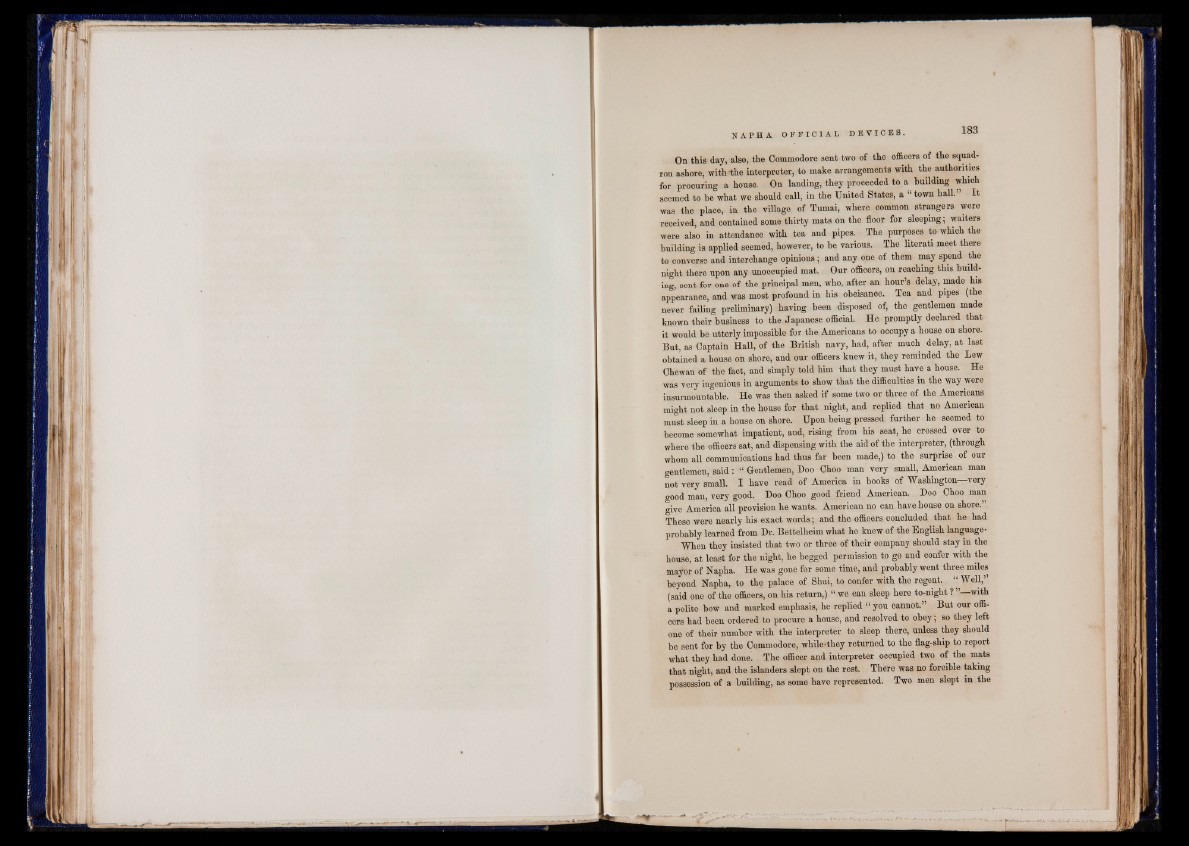
k a p h a o f f i c i a l d e v i c e s . 183
On this day, also, the Commodore sent two of the officers of the squadron
ashore, with-the interpreter, to make arrangements with the authorities
for proouring a house. On landing, they proceeded to a building which
seemed to he what we should call, in the United States, a “ town hall.” I t
was the place, in the village of Tumai, where common strangers were
received, and contained some thirty mats on the floor for sleeping; waiters
were also in attendance with tea and pipes. The purposes to whioh the
building is applied seemed, however, to be various. The literati meet there
to oonverse and interchange opinions; and any one of them may spend the
night there upon any unoccupied mat. Our officers, on reaohing this building,
sent for one of the principal men, who, after an hour’s delay, made his
appearance, and was most profound in his obeisance. Tea and pipes (the
never failing preliminary) having been disposed of, the gentlemen made
known their business to the Japanese official. He promptly declared that
it would be utterly impossible for the Americans to occupy a house on shore.
But, as Captain Hall, of the British navy, had, after much delay, at last
obtained a house on shore, and our officers knew it, they reminded the Lew
Chewan of the fact, and simply told him that they must have a house. He
was very ingenious in arguments to show that the difficulties in the way were
insurmountable. He was then asked if some two or three of the Americans
might not sleep in the house for that night, and replied that no American
must sleep in a house on shore. Upon being pressed further he seemed to
become somewhat impatient, and, rising from his seat, he crossed over to
where the officers sat, and dispensing with the aid of the interpreter, (through
whom all communications had thus far been made,) to the surprise of our
gentlemen, said: “ Gentlemen, Doo Choo man very small, American man
not very small. I have read of America in books of Washington—very
good man, very good. Doo Choo good friend American. Doo Choo man
give America all provision he wants. American no can have house on shore.”
These were nearly his exact words; and the officers concluded that he had
probably learned from Dr. Bettelheim what he knew of the English language-
When they insisted that two or three of their oompany should stay in the
house, at least for the night, he begged permission to go and confer with the
mayor of Napha. He was gone for some time, and probably went three miles
beyond Napha, to the palace of Shui, to confer with the regent. “ Well,”
(said one of the officers, on his return,) “ we can sleep here to-night ? ’’—with
a polite bow and marked emphasis, he replied “ you cannot.” But our officers
had been ordered to procure a house, and resolved to obey; so they left
one of their number with the interpreter to sleep there, unless they should
be sent for by the Commodore, while-they returned to the flag-ship to report
what they had done. The officer and interpreter occupied two of the mats
that night, and the islanders slept on the rest. There was no foroible taking
possession of a building, as some have represented. Two men slept in the